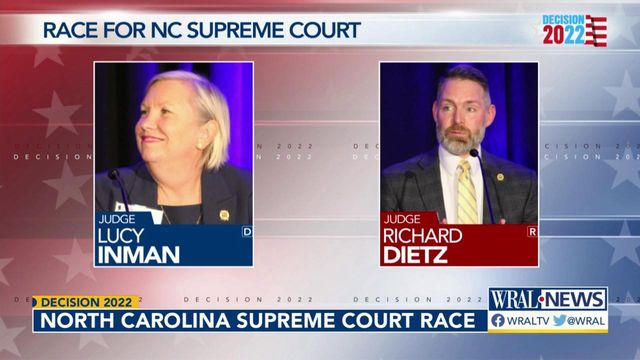How to judge a judge: A guide for North Carolina voters
How do you know who to vote for in judicial elections? Ask a lawyer, court clerk or bailiff, legal experts say
Posted — UpdatedIf you don’t know who to vote for in North Carolina’s coming judicial elections, ask a lawyer, a clerk, a bailiff — anyone who works with judges day in, day out.
They know who the good judges are, and they’re used to being asked.
That was the clear, though not unanimous, consensus when WRAL News asked lawyers, judges and retired judges, with a collective 250 years legal experience, how people should go about researching judicial candidates and deciding who to vote for.
“The lawyers want good judges,” said retired Chief District Court Judge Robert Rader, Wake County’s longest-serving district court judge. “They’re usually pretty honest in who they would vote for.”
There are also four contested races for the state Court of Appeals, a middle step between the lower courts and the state Supreme Court.
But most of the judicial races on the ballot this year are at the superior and district court levels. These are the courts that handle misdemeanor cases and felonies, as well as most civil suits. Sitting judges in these trial courts often run for re-election unopposed, simplifying the decision for voters.
These are all partisan races. With the possible exception of Supreme Court races, they are often low-information affairs.
“I imagine a lot of votes are cast where they’re just taking a guess,” said Lee Turner, a former Raleigh police officer-turned-attorney.
Forums, guides and Google
The North Carolina State Board of Elections publishes a voter guide where appellate court candidates get to make their case. The guide doesn’t cover superior and district court candidates, only the appellate courts.
The guide will be mailed to every household in North Carolina, but is not expected to go online.
Candidates often have websites, but experienced judges and attorneys told WRAL News that biographies and position statements only tell you so much. Wake County Superior Court Judge Paul Ridgeway, who is unopposed for reelection this year, said guides tend to paint a monochrome picture of the candidates.
“We’re all diligent, professional, honest,” Ridgeway said. “My sense is that just going to the campaign page or the voter guides doesn’t give you a great deal of insight.”
But if judges participate in forums and take the time to fill out voter guide questionnaires, if they answer questions “carefully and purposefully,” that’s a good sign, Wake County Public Defender Deonte' Thomas said.
If you’re particularly motivated, you can read judicial opinions, Ridgeway said. Just Googling a judge and reading news coverage of how they handled a high profile case — their temperament and demeanor — can help, he said.
Look also to endorsements, retired Superior Court Judge Carl Fox said. If possible, go sit in a judge’s courtroom for an hour.
“One of the best things is: Is the judge a good listener?” Fox said.
To put it all another way: Don’t just trust a résumé.
“They may not have the life experiences,” Turner said. “The ability to read people. There’s a lot that goes into being a judge that’s not necessarily based on your education.”
Party labels and race
Lawyers warn voters: Don’t just look to party labels, particularly in the lower court races.
“States judges are the last line of defense to protect civil rights and personal autonomy,” said Dawn Blagrove, an attorney and executive director of Emancipate NC, a criminal justice reform group.
“I would strongly discourage anyone from voting party line for many reasons, the most important being that informed voters elect people based on issues, not party affiliation,” Blagrove said.
Thomas, whose cases come before district and superior court judges, echoed that.
“I have been in front of stereotypically ‘conservative’ judges that are a pleasure to try a case in front of and are fair and not ‘tough on crime,’ the Wake public defender said. “And I have been in front of ‘progressive’ judges that will throw the book at my clients.”
Race should be a factor, according to Randy Griffin, a defense attorney in Durham.
“I see a lot more Black and brown people facing charges when I'm in a courtroom than I see lawyers and judges and police officers,” he said.
The North Carolina Bar Association used to grade judges based on surveys of practicing attorneys, gauging judges’ knowledge of the law, integrity, communication skills, temperament and administrative capability. The results were published online, but the association stopped four years ago, Bar Association President Clayton Morgan said, because so few people visited the website.
Now Morgan recommends people pay attention to judicial candidate forums. It’s “dangerous” to trust a single attorney’s opinion, he said.
“We’re looking at it through our particular lens,” said Morgan, associate general counsel for Duke Energy.
Partisan elections less common
Partisan elections are less common. Eleven states, including North Carolina, use party labels in trial courts, according to the center. Only eight use partisan elections to pick high court judges.
The public funding was eliminated in 2013, after Republicans took control of the General Assembly following decades of mostly Democratic Party control.
Now the statewide elections are highly partisan, expensive affairs. The 2020 Supreme Court race between then Chief Justice Cheri Beasley, now the Democratic nominee for U.S. Senate, and current Chief Justice Paul Newby, a Republican, generating millions of dollars in advertising. Newby won by 401 votes.
Griffin, the Durham defense attorney, said the first thing he asks a client who complains about a judge, or a district attorney for that matter, is whether they voted in the last election.
“Make sure you’re part of the process,” Griffin said. “If you’re not voting, why would an elected official care what your opinion is?”
Voter resources
• Credits
Copyright 2024 by Capitol Broadcasting Company. All rights reserved. This material may not be published, broadcast, rewritten or redistributed.






